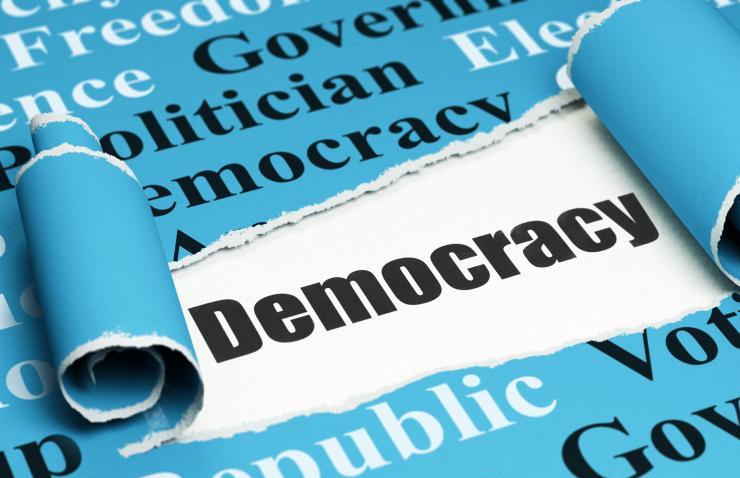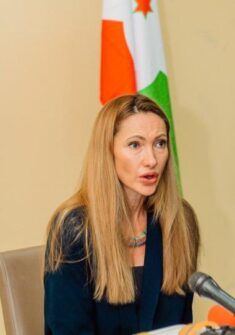Africa. Democracy and Human Rights: the EU offers a weak response to violations.

Over the last months, democracy and human rights have been endangered in several African countries. But Western countries either turn a blind eye or offer weak responses, based on the quest for natural resources or the wish to reduce the Chinese
and Russian influence.
Over the last months, democratic principles and human rights have been violated in several African countries. In Senegal which was long considered the paragon of Democracy on the continent, young protesters clashed with security forces, resulting in at least 30 deaths and hundreds of arrests in early June, after the young and charismatic opposition leader Ousmane Sonko was sentenced to two years prison.

Senegal’s main opposition leader Ousmane Sonko. Photo: Nova News
Sonko was sentenced on charges of ‘corrupting’ youth after he was acquitted of rape charges, for which he had been indicted. His lawyer, Bamba Cissé, like the supporters of Sonko’s African Patriots of Senegal for Work, Ethics and Fraternity (PASTEF) party, claims that the arrest and the judgement were part of a government’s plan to prevent him from participating in the presidential elections scheduled in 2024. In addition, the government restricted access to social media and suspended mobile phone data. For many observers, Sonko is a potential winner of the upcoming election, since the young support his anti-authoritarian stance. This is not the first time that the judiciary is used to eliminate president Macky Sall’s rivals. In 2015, the son of his predecessor, Karim Wade was given a sentence for illegal enrichment which prevented him to run for the presidency. Two years later, the popular mayor of Dakar, Khalifa Sall was condemned for alleged embezzlements of public funds and could not run at the 2019 presidential election, raising suspicions of a political bias. On the last 4 July, eventually, Sall announced in a speech to the Nation that he would not run. It is unclear whether the decision was inspired by his sense of ethics, local or international pressures but for many Senegalese, the damage is done. The riots have taken place and the main opponent risks not being allowed to run for the February 2024 elections.
Elections in DRC
Democracy is also in danger in the Democratic Republic of the Congo. In June, two important opposition leaders called for a boycott of the forthcoming election, scheduled for next December. The former President, Joseph Kabila urged his supporters not to register on the electoral lists and accused the Supreme Court whose judges were appointed by President Felix Tshisekedi in violation of the constitution to be “partial and corrupt”.

Martin Fayulu, leading opposition candidate in the Democratic Republic of the Congo, has threatened to pull his party out of December’s elections (DRC). Photo: ECIDE Office.
Martin Fayulu, who appeared as the landslide winner of the 2018 presidential winner according to the monitoring teams of the roman catholic national bishops conference (CENCO), said shortly afterwards that his party ECIDE (Engagement for Citizenship and Development), would not participate in the upcoming elections if the voters list was not redone and audited. Accordingly, voter identification and registration were organized in total opacity, which is proof of the planning of fraud. CENCO and the main protestant churches also reported for months of delays and issues with the registration of voters.
Earlier, on 20 May, a demonstration called by Fayulu, the popular former governor of Katanga, Moise Katumbi and former Prime Minister, Augustin Matata Ponyo was banned by the Kinshasa authorities. Besides a massive mobilization of the police, militias of Tshisekedi’s party, the Union for Democracy and Social Progress (UDPS) were displayed around the streets where the march was supposed to take place, armed with machetes, to intimidate demonstrators.

The military intelligence accused Salomon Kalonda of spying on behalf of Rwanda and of the M23 Congolese Tutsi rebels. Twitter
The arrest of Katumbi’s adviser, Salomon Kalonda, on 30 May, at the Kinshasa airport came as a shock for the opposition. The military intelligence accused Kalonda of spying on behalf of Rwanda and of the M23 Congolese Tutsi rebels. But this justification is considered as a pretext by Katumbi supporters who blame an attempt to involve their leader in a fake plot against Tshisekedi to prevent him to run in December. Tensions are also rising between the President and the churches. In a speech at the stadium of Mbuji-Mayi, on 25 June, President Tshisekedi attacked the roman catholic church, which calls for free, fair and transparent elections, blaming its “dangerous drift”. During the speech, Tshisekedi stated: “I will attack without hesitation or remorse any Congolese who poses a threat to the security and stability of the country. No matter what people say about human rights violations, deprivation of liberty”.
In Burundi, the main opposition party, the National Council for Liberty (CNL) led by Agathon Rwasa was suspended on 7 June by the Minister of Interior, Martin Niteretse who took the pretext of an internal dispute within the CNL to order a ban of its activities. The CNL called the decision a “serious violation of the constitution” which prohibits interference of the government into the functioning of political parties. Such decision could ruin the conditions for free and fair legislative elections in 2025.

Agathon Rwasa, the leader of the National Liberation Forces. Photo : FNL Office
Previously, on 21 April, the government announced the arrest at Kabezi, in the Bujumbura province, of the former Prime Minister, Alain-Guillaume Bunyoni, who had been sacked in September 2022 by President Evariste Ndayishimiye. Simultaneously, the government is continuing its persecution of the gay community. Since 2009, homosexual relations are considered a crime punishable which deserve imprisonment.
On the last 23 February, 24 people accused of “homosexual behaviour” were arrested and jailed in the political capital, Gitega. According to Yves Niyonkuru, one of the prominent figures of the “Rainbow Candle Light” association which defends gay and lesbian rights in the country, tortures, murders and imprisonment of gays and lesbians are commonplace in Burundi. This is not surprising since the President urged his compatriots to ban homosexuals who must allegedly be “damned”, in a public speech, on the 1st of March 2023.
Human Rights, the weak response by the EU
In front of all these violations of human rights and democratic principles, the response of the West has been mere lip service. France and the European Union expressed “concern” in front of the deterioration of the situation in Senegal and called for “restraint”.
The French Foreign Ministry urged all sides “to stop violence and solve the crisis in the spirit of the long democratic tradition of Senegal”. While expressing similar concern, the EU said it was confident that the Senegalese democracy was solid and that political forces would prepare the forthcoming elections in an inclusive and peaceful way.

Kinshasa CENI Headquarters. Photo: Monusco
Concerning the DRC, the US, the EU and other Western powers said in a joint statement that an audit of the electoral lists set by DRC’s Independent National Electoral Commission (CENI), by international experts in May had not “fostered the public perception of independent and transparent oversight”. But in contrast with the International Organization of Francophonie which refused to approve the preparation of the ballots by CENI, the EU took in June a much softer approach. The leader of a team of the European External Action Service said after talks with CENI’s chairman Denis Kadima, that Brussels would announce in September if the conditions were met to send an EU mission of observers. No real pressure is exerted on the Congolese authorities to correct the situation.

The EU chargé d’affaires Martina Borovac. Photo: EU Press
During a meeting with the local authorities, on 22 June, the EU chargé d’affaires Martina Borovac, deplored Burundi’s abstention at the UN during the votes against the Russian attack of Ukraine and the attacks against gays and lesbians. She also expressed the wish that UN special rapporteur on human rights should be allowed to come to Burundi and reminded that the EU was asking its partner to open the political space in order to “improve the quality of democracy”. But overall, her tone was quite soft. Despite the persecutions of opponents and journalists who fled in exile and the exodus of 400,000 refugees in neighbouring countries, Borovac expressed the EU’s “appreciation” of the improvement of the bilateral relations over the recent years. She added that the EU was considering the resumption of budgetary support to Burundi. Already, in October 2022, the EU lifted sanctions on three Burundian officials including Prime Minister Gervais Ndirakobuca
Obviously, the times have changed since the EU introduced the Cotonou Agreement, signed in 2000, an article which envisaged the suspension of cooperation with countries which do not respect human rights, democracy and the rule of law. Since then, a new context has emerged, characterized by the erosion of the Western influence in Africa. China has become Africa’s first economic partner while Russia has emerged as a key partner in the security sector. Simultaneously, the EU behaved as if it realized it cannot raise the tone too much if it wants access to strategic natural resources coveted by its rivals.
Senegal’s potential role in cooperating with the EU on the migration front seems today more important to Eurocrats than the bias of the national judiciary against opposition leaders. Since early 2022, the EU has lobbied in order to obtain Dakar’s agreement for the deployment of its anti-migration force Frontex on the Senegalese coasts. The EU is planning indeed to deploy a fleet of vessels and drones, in Senegalese ports to track the migrants and deter them to reach the Canary Islands.

Coltan Mine in DRC. Photo: Pexels.
The DRC is emerging as a strategic partner for the European automotive industry, at a time when most of its cobalt, copper and lithium resources used for the production of batteries for electric cars, are in the hands of the Chinese. In June, the EU and the DRC were holding talks to set up a partnership for the exploitation of rare and strategic minerals. The EU is indeed eager to reduce its dependency from Chinese batteries, while Kinshasa is willing to benefit from the bonanza and the opportunities to set up a value chain including the beneficiation of its minerals locally. The stakes are considerable for both sides, which might explain why the EU, as the US which also promised to help the DRC to build its own batteries plants, is not so keen to spoil the atmosphere by lecturing Tshisekedi on human rights and democracy.
The attitude with Burundi is quite similar. The country boasts from sizeable nickel resources which may be used for the production of batteries and also from rare earth elements. The main company on the ground Rainbow Mining Burundi used to sell its rare earth concentrates to the German company ThyssenKrupp before it put a halt on mining exploitation to improve the terms of the contracts in 2021. Another reason for the EU’s relative leniency towards Burundi is the role plaid in the fight against jihadists by Burundian peacekeepers in Somalia, whose salaries are financed by the European taxpayer.
François Misser



